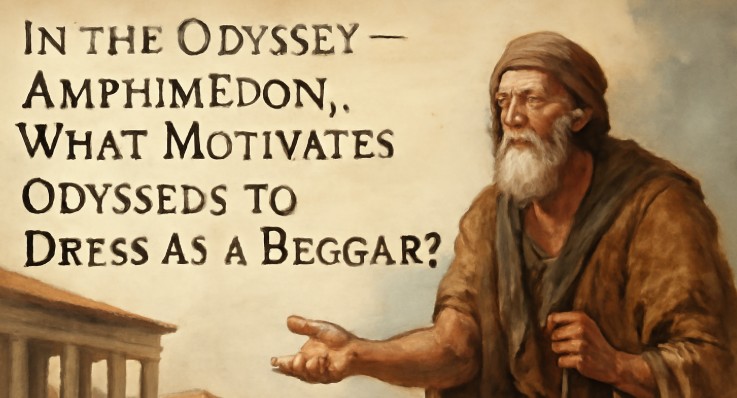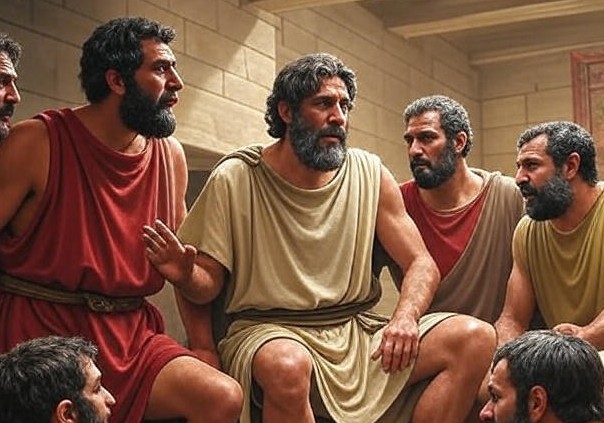
What Motivates Odysseus to Dress as a Beggar in The Odyssey?
In Homer’s The Odyssey, the hero Odysseus undergoes a journey that spans a decade, encountering divine beings, monstrous creatures, and an array of trials that challenge his resilience, intellect, and wit.
After enduring years of peril, one of the most striking moments in the epic is when Odysseus disguises himself as a beggar upon his return to Ithaca.

This decision, while seemingly humble, serves as a key tactical move and reveals a great deal about his character.
But what motivates Odysseus to dress as a beggar in the first place? Is it mere survival, divine intervention, or a deeper strategic purpose? Let’s explore the motivations behind Odysseus’s beggar disguise and its significance in The Odyssey.
The Role of Disguise in The Odyssey
In order to understand why Odysseus chooses to dress as a beggar, we must first understand the role of disguise in Greek literature.
Throughout The Odyssey, disguise serves as a crucial narrative device. Often, gods use disguise to manipulate the actions of mortals, and Odysseus himself is known for his cunning and intellectual prowess.
The act of dressing as a beggar in The Odyssey is a tactical move designed not only to hide his true identity but also to navigate the dangers awaiting him in Ithaca. The use of disguise in The Odyssey is emblematic of the larger themes of deception, survival, and intelligence that permeate the epic.
Why Does Odysseus Dress as a Beggar? The Practical Motivation
The immediate and most practical reason why Odysseus dresses as a beggar is to enter his home unrecognized and gather information about the suitors who have overrun his palace.
These suitors are not only disrespecting his household but also consuming his wealth and making unwanted advances toward his wife, Penelope.
They have no idea that Odysseus is still alive, and their behavior has become increasingly arrogant and disrespectful.
By disguising himself as a beggar, Odysseus can move undetected, observe the suitors’ behavior, and formulate a plan for reclaiming his throne.
Dressing as a beggar allows Odysseus to test the loyalty of those around him, especially his family and servants.
He can observe how Penelope has been faring in his absence and determine whether she remains faithful to him.
The beggar disguise grants Odysseus a chance to assess his environment, to make sure he is prepared for the inevitable confrontation with the suitors when the time comes.
It gives him a moment of strategic advantage—a chance to observe and prepare for action.
The Psychological Motivation Behind the Disguise
Beyond the practical reasons, Odysseus’s decision to dress as a beggar also reflects his psychological state and the evolution of his character.
After ten years of war and another ten years of wandering, Odysseus has faced immeasurable hardships. He has dealt with monsters, gods, and temptations that have tested not just his physical strength, but his mental fortitude. His experiences have shaped him into a more reflective and self-aware individual.

The act of dressing as a beggar is also a symbol of humility. Odysseus, though still a mighty hero, understands that his previous methods of brute strength are not enough to solve his problems anymore.
He has learned the importance of patience, strategy, and subtlety. By donning the beggar’s clothes, Odysseus demonstrates a profound understanding of the need for humility and emotional control.
He has matured beyond the warrior who relies on force and recognizes that cunning and subterfuge can often accomplish what strength cannot.
This shift is crucial to his survival. The beggar disguise is not just about hiding his identity; it’s a reflection of the wisdom that Odysseus has gained through his arduous journey.
The disguise allows him to play his role effectively, and it represents the balance between strength and intellect that defines the hero’s growth.
Athena’s Role in Odysseus’s Decision to Dress as a Beggar
Odysseus’s decision to dress as a beggar is also heavily influenced by the goddess Athena, his divine patron.
Throughout The Odyssey, Athena acts as Odysseus’s guide and protector, offering advice and assistance when necessary. It is Athena who suggests that Odysseus disguise himself upon his return to Ithaca.
This divine endorsement highlights the fact that the decision to dress as a beggar is not simply an individual choice but one that aligns with divine strategy.
Athena’s guidance emphasizes the importance of transformation and adaptability. By disguising himself as a beggar, Odysseus embodies the virtues of strategic thinking and patience.
Athena, as the goddess of wisdom and warfare, understands the power of subtlety and deception, and she knows that Odysseus will succeed not through sheer force, but through intellect and planning.
The beggar disguise, therefore, becomes a divine-backed tactic, designed to help Odysseus regain control over his kingdom.
The Symbolism of the Beggar Disguise in The Odyssey
The beggar disguise carries profound symbolic meaning in The Odyssey. Odysseus’s return to Ithaca is not just the return of a man to his home, but the return of a transformed hero.
After so many years of struggle, Odysseus returns not as the same king and warrior who left but as a more humble, introspective figure.
His decision to dress as a beggar represents a kind of rebirth—a stripping away of the old, heroic identity in favor of a more strategic and thoughtful persona.
In many ways, the beggar’s disguise highlights the theme of transformation that runs throughout the epic. Odysseus is not simply returning home to reclaim his throne; he is returning as a wiser, more self-aware man. His disguise is both a literal and figurative shedding of his former self.
He is no longer just the brute force hero of war but a man who understands that heroism often requires restraint, patience, and intellect.
This transformation is central to the epic’s larger themes. Odysseus’s journey is not just about physical survival but about emotional and intellectual growth.
The beggar’s disguise symbolizes the personal growth he has undergone during his time away from Ithaca, marking his evolution from a mere warrior to a hero who understands the importance of subtlety, patience, and wit.
The Symbolic Importance of the Beggar in Greek Mythology
In Greek mythology, beggars are often seen as symbols of both vulnerability and divine protection. The beggar is a figure that is socially marginalized, often looked down upon, but also one who may possess hidden wisdom or divine favor.
This is particularly true in The Odyssey, where the beggar figure embodies both a social outcast and a strategic genius. In the case of Odysseus, the beggar becomes a symbol of his intellectual superiority over the suitors.

The beggar, while humble and seemingly powerless, ultimately prevails over the arrogant suitors, who fail to recognize the wisdom beneath the disguise.
Odysseus’s choice to dress as a beggar also plays into the idea of justice in The Odyssey. The beggar’s low status allows him to observe the behavior of the suitors, assess their character, and, when the time comes, execute justice.
The beggar figure, therefore, is not merely a symbol of humility; it is a tool for delivering retribution and restoring order to Odysseus’s household.
Conclusion: The Multiple Motivations Behind Odysseus’s Beggar Disguise
Odysseus’s decision to dress as a beggar in The Odyssey is motivated by a combination of practical, psychological, divine, and symbolic reasons.
On a practical level, the disguise allows him to enter his home unnoticed, assess the situation with the suitors, and prepare for the eventual confrontation.
Psychologically, it represents his growth as a hero, emphasizing the importance of patience, humility, and strategy.
Athena’s divine guidance underscores the fact that Odysseus’s actions align with a greater plan. And symbolically, the beggar disguise marks Odysseus’s transformation from a warrior focused on strength to a hero who values intellect and subtlety.
Ultimately, Odysseus’s choice to dress as a beggar is a testament to his evolution as a character. He is no longer defined solely by his physical prowess but by his ability to think strategically and act with wisdom.
In the end, it is through his cleverness and patience, embodied by the beggar disguise, that Odysseus is able to reclaim his throne and restore order to his household.
Through this action, Odysseus exemplifies the true nature of heroism in The Odyssey—not brute force, but the power of intellect, resilience, and divine guidance.
FAQs Related to Odysseus Dressing as a Beggar in The Odyssey
Why does Odysseus disguise himself as a beggar in The Odyssey?
Odysseus disguises himself as a beggar to assess the situation in his palace upon returning to Ithaca. The suitors have overrun his household, disrespecting his family and consuming his wealth.
The disguise allows Odysseus to observe their behavior and plan his next move without revealing his identity, gathering crucial information before he confronts them.
What role does Athena play in Odysseus’s decision to dress as a beggar?
Athena, Odysseus’s divine protector, advises him to disguise himself as a beggar upon his return to Ithaca.
Her guidance highlights the importance of strategy and wit over brute strength, aligning with Odysseus’s need to rely on intelligence to reclaim his throne and restore order.
How does Odysseus’s disguise symbolize his growth as a hero?
Odysseus’s decision to dress as a beggar symbolizes his transformation from a warrior focused on physical strength to a hero who values intellect, patience, and strategy.
It represents his understanding that wisdom and restraint are often more powerful than brute force, reflecting the personal growth he has undergone during his journey.
What does Odysseus learn from dressing as a beggar in The Odyssey?
By dressing as a beggar, Odysseus learns to observe his enemies and allies more carefully. He tests the loyalty of his servants and assesses Penelope’s situation.
The beggar disguise also teaches him the value of patience, humility, and emotional control—key traits for overcoming the challenges he faces.
What is the significance of the beggar in Greek mythology?
In Greek mythology, beggars are often seen as vulnerable figures with hidden wisdom or divine protection.
They may be outcasts in society, yet their role often carries significant meaning. In The Odyssey, the beggar figure allows Odysseus to outwit the suitors, showcasing the power of intelligence and divine favor.
How does Odysseus’s beggar disguise affect the suitors?
The suitors underestimate Odysseus when he is dressed as a beggar, seeing him as weak and unimportant.
This allows Odysseus to gather information and later exact justice. His beggar disguise serves as a tool for revealing the true character of the suitors, many of whom are arrogant and disrespectful.
Is Odysseus’s disguise as a beggar a sign of weakness?
No, Odysseus’s disguise as a beggar is not a sign of weakness but a tactical move. It shows his wisdom and ability to adapt to situations.
Instead of confronting the suitors directly with force, he uses his wit and patience to plan a more strategic and effective approach.
What themes are represented by Odysseus’s decision to dress as a beggar?
Odysseus’s decision represents several themes in The Odyssey, including transformation, intelligence over strength, and the value of patience.
His disguise symbolizes the idea that heroism is not just about physical power but also about mental and emotional strength, which plays a crucial role in his journey back home.
Does the disguise reveal any moral lessons in The Odyssey?
Yes, the disguise teaches several moral lessons, such as the importance of humility, patience, and the strategic use of intelligence.
Odysseus’s disguise serves as a reminder that sometimes the most powerful form of heroism is not about direct confrontation but about using one’s mind to overcome challenges.



